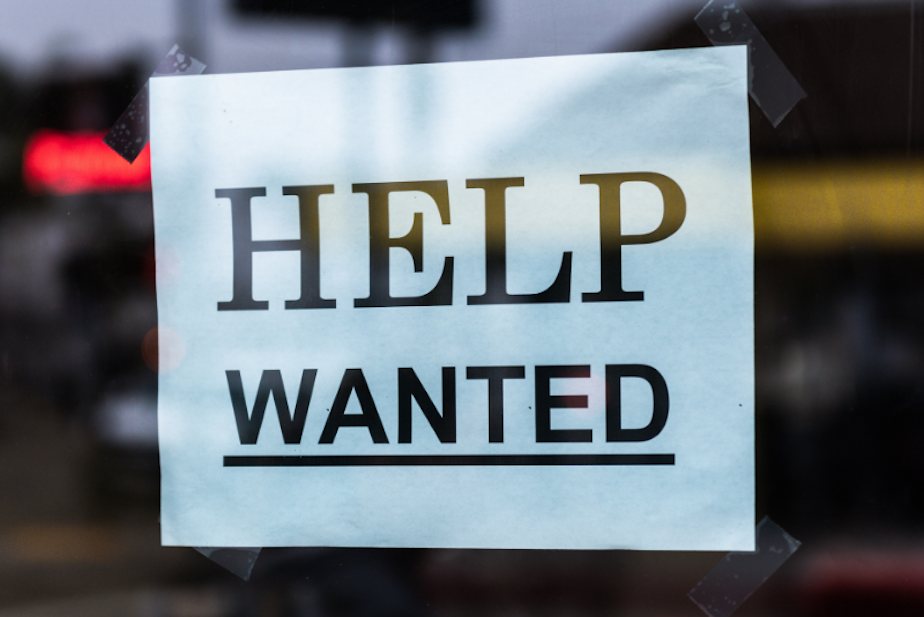Yes take-backs. Workers asked to return pandemic cash in Washington state

Last month, joblessness in Washington state reached its highest levels since the Covid-19 pandemic – higher than the national average. And the first thing many do when they’ve lost a job is file for unemployment benefits.
But Washington’s unemployment system itself is still reeling from the one-two punch of Covid.
During the pandemic applications spiked, a massive fraud scheme took $1 billion from the system, and hundreds of millions of dollars were overpaid, partially through confusion on the part of people claiming benefits.
That's the situation Gary Moon found himself in when he applied for unemployment on behalf of his son, Kenneth. Kenneth is a high-functioning person with autism, and during the beginning of the pandemic, he was briefly let go from his part-time job in Auburn.
Kenneth was working around 10 hours a week, disqualifying him for regular unemployment. But he was eligible for a special federal pandemic assistance program designed to help part-time employees like contract and gig workers.
Kenneth returned to work at the same job a few months after being laid off. At that point, Moon wasn’t sure if they should continue filing for the extra Covid-era benefit. But based on advice he was able to find in unemployment groups online, he kept filing. Father and son made sure to report Kenneth's new income, and along the way, Moon checked all the boxes he thought he was supposed to check.
All the while, he was a little uneasy. It was hard to get answers from the state’s Employment Security Department (ESD).
Sponsored
"It wasn’t unusual at that time to be waiting on the phone for three hours," Moon said. "I call one person, they say go ahead and just continue filing your claims. As long as you're reporting your income and your hours, everything will be fine."
After a year of payments, Moon received a notice from the state. It said that for the last year, Kenneth should not have collected unemployment. According to the state, the claims should have been denied. From the state’s perspective, Moon had misrepresented his son’s financial situation and the state wanted those overpaid funds paid back, with interest.
The total was roughly $30,000, and Moon says it’s all because he filled out paperwork the way he thought he was supposed to.
"I believe that when you say it was misrepresented, it requires bad intent... or you provided false answers to questions, or something like that. In this situation, I never answered questions like these before," Moon said.
Since that initial notice, Moon has felt whiplash trying to navigate the ins and outs of the state’s unemployment system. His appeal of the overpayment decision was denied, but after some review, the state found that it had erred in its initial calculation, and knocked down his balance by about $10,000. That put Moon on the hook for a remaining $19,000, which he is paying off through a payment plan with the state while he waits to see if he qualifies for an overpayment waiver.
Sponsored
The state revised its policy last year to make more than 100,000 people eligible for overpayment forgiveness if they can prove “equity and good conscience” reasons, such as not understanding English instructions or being unable to get through to the Employment Security Department with questions. But like many other people, the wait for Moon has taken close to a year.
According to attorney Anne Paxton, the issues Moon encountered with the unemployment system are all too common. The ongoing problems also make it harder for people who legitimately need unemployment benefits to access funds. Paxton works with the Unemployment Law Project (ULP), which offers civil legal aid to people who have been denied benefits, and recently published a study detailing problems in Washington’s unemployment system.
Many situations were like Moon's, where the variety of pandemic programs, the applications themselves, and the lack of accessible help led to confusion.
"What we heard over and over the level of stress that that instills in people is indescribable," Paxton said. "Because we're not talking about waiting in a queue at the supermarket, we're talking about people who are looking at not being able to pay for groceries next month, or being evicted from their apartment."
The ULP study spoke with 100 claimants about their experience with the online unemployment application and their experience with the ESD.
Sponsored
To improve the experience, the study recommended expanding data tracking to make sure benefits are being distributed equitably; clearer availability and communication from agency representatives to help claimants apply and maintain their eligibility; and mitigating employers' ability to slow down and dissuade employees from applying for unemployment.
In an email, J.R. Richards, director of the Unemployment Insurance Customer Service, sent the following statement in response to the study:
“What’s important to us is those who are eligible for benefits know they are eligible and that they receive their benefits in a timely manner. We recognize and agree that continued improvements in customer service delivery are needed. We continue to listen to the voice of our customers and use that feedback to improve the way we serve them. Our focus is on equitable, accessible services that meet our customers in the ways and places they want to interact with us. That means we are working to uncover areas where we are falling short and improve it.”
Regarding overpayment notices, the ESD also said they have waived $59 million in overpayments — just over 60% of applications — with the goal of processing all waivers by December 2024.
Listen to the full Soundside segment by clicking "play" on the audio icon at the top of this story.





